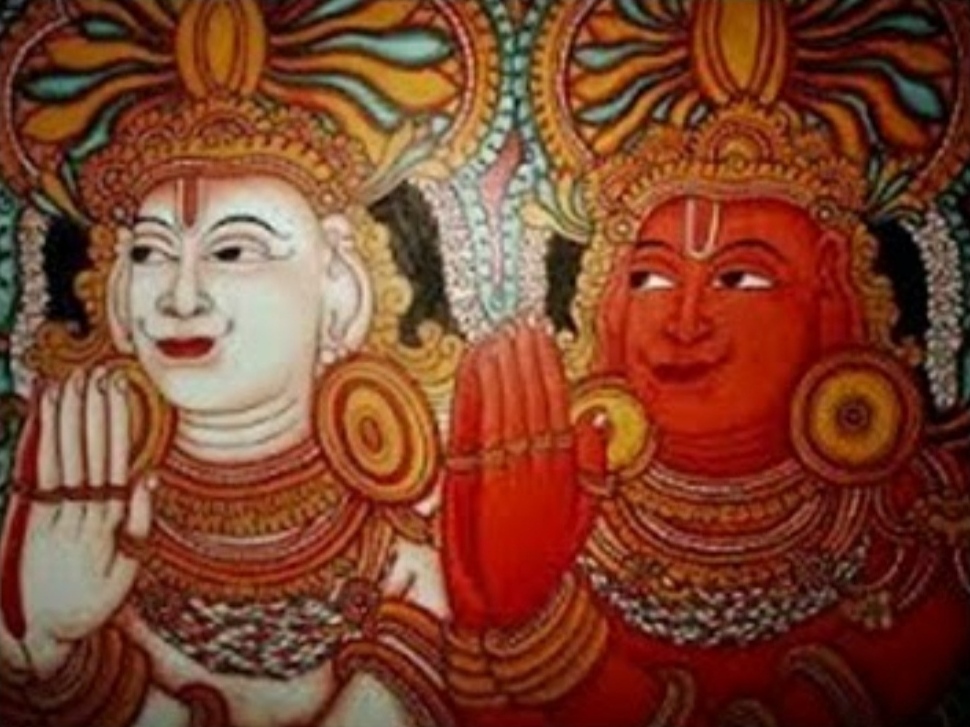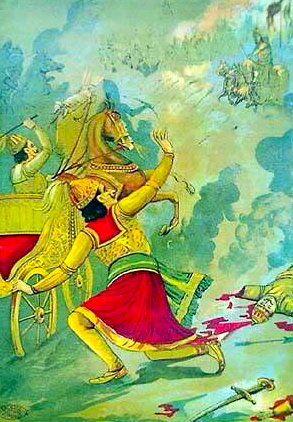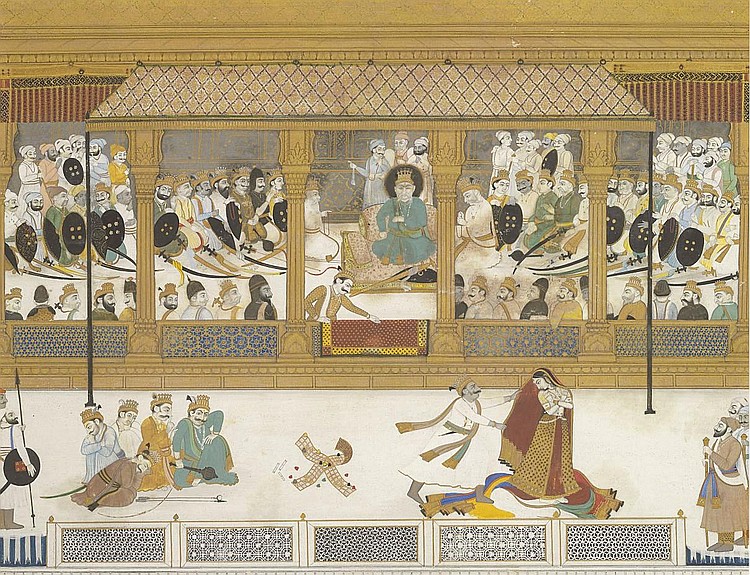|
Kunti
Kunti (, un̪t̪iː ), also known as Pritha (, ">r̩t̪ʰaː/nowiki>, ), is a prominent female character in the ancient Hindu epic '' Mahabharata''. She is chiefly recognised as the mother of the central characters—the five Pandavas—having given birth to the three eldest, Yudhishthira, Bhima, and Arjuna, while also raising their younger stepbrothers, the twins Nakula and Sahadeva, as her own. She is portrayed as possessing intelligence, beauty and shrewdness. Born to the Yadava chief Shurasena, Pritha was adopted by her childless uncle, Kuntibhoja, and subsequently bestowed with the name Kunti. During her adolescence, she garnered the favour of the sage Durvasa, receiving a divine '' mantra'' which she could use to invoke any god and bear his child. Intrigued and wanting to test its efficiency, she employed this mantra to invoke the sun god Surya, resulting in the birth of her first born son, Karna. Faced with the societal stigma associated with bearing a chi ... [...More Info...] [...Related Items...] OR: [Wikipedia] [Google] [Baidu] |
Madri
Madri (, ), also known as Madravati (, ), is a character in the ''Mahabharata'', one of the two major Mahakavya, Hindu epics. She is the princess from the Madra Kingdom and becomes the second wife of Pandu, the king of the Kuru kingdom, Kuru Kingdom. She is the mother of the twins Nakula and Sahadeva, the youngest of the five Pandava brothers. Madri is the daughter of Madraraja—the king of Madra—and sister of Shalya. Her marriage to Pandu is arranged by Bhishma, the grandsire of the Kuru dynasty, in exchange for a heavy bride price. Pandu is cursed that he would die if he engaged in sexual relations. Following the curse, Madri accompanies Pandu in his self-imposed exile, along with Pandu's first wife, Kunti. Using Kunti's divine boon, Madri invokes the twin gods Ashvins to conceive her twin sons. Later, the cursed Pandu dies when he is overcome by desire and attempts to engage in lovemaking with Madri. Overcome with remorse and grief, Madri entrusts her sons to Kunti's car ... [...More Info...] [...Related Items...] OR: [Wikipedia] [Google] [Baidu] |
Panchakanya
The Panchakanya () is a group of five iconic women of the Hindu epics, extolled in a hymn and whose names are believed to dispel sin when recited. They are Ahalya, Draupadi, Kunti, Tara (Ramayana), Tara, and Mandodari. While Draupadi and Kunti are from the ''Mahabharata'',Chattopadhyaya pp. 13–4 Ahalya, Tara, and Mandodari are from the ''Ramayana''. The Panchakanya are regarded to be ideal women who exemplify perfect wives in Hinduism. Etymology Panchakanya literally means five ''kanya''s. ''Kanya'' may be translated as girl, daughter, maiden, or virgin. Hymn A well-known Sanskrit hymn that defines the Panchakanya runs as: ''Sanskrit transliteration'' English translation Ahalya, Draupadi, Sita, Tara and Mandodari One should forever remember the panchakanya who are the destroyers of great sins A variant from the of Brahma Purana, Brahma purana 3.7.229 by Vyasa replaces Sita with Kunti: ''Sanskrit transliteration'' Differences are underlined. Practising Hindus, es ... [...More Info...] [...Related Items...] OR: [Wikipedia] [Google] [Baidu] |
Karna
Karna (Sanskrit: कर्ण, IAST: ''Karṇa''), also known as Vasusena, Anga-Raja, Sutaputra and Radheya, is one of the major characters in the Hindu epic ''Mahābhārata''. He is the son of Surya (the Sun deity) and princess Kunti (later the Pandava queen). Kunti was granted the boon to bear a child with desired divine qualities from the gods and without much knowledge, Kunti invoked the sun god to confirm it if it was true indeed. Karna was secretly born to an unmarried Kunti in her teenage years, and fearing outrage and backlash from society over her premarital pregnancy, Kunti had to abandon the newly born Karna adrift in a basket on the Ganges. The basket is discovered floating on the Ganges River. He is adopted and raised by foster ''Suta'' parents named Radha and Adhiratha Nandana of the charioteer and poet profession working for king Dhritarashtra. Karna grows up to be an accomplished warrior of extraordinary abilities, a gifted speaker and becomes a loyal friend of ... [...More Info...] [...Related Items...] OR: [Wikipedia] [Google] [Baidu] |
Characters In The Mahabharata
The '' Mahabharata'' is one of the two major Sanskrit epics of ancient India composed by Veda Vyasa. At its heart lies the epic struggle between the Pandavas and the Kauravas. The central characters include the five Pandava brothers— Yudhishthira, Bhima, Arjuna, Nakula, and Sahadeva—along with their wife Draupadi. On the opposing side, the hundred Kaurava brothers are led by the elder brother, Duryodhana. However, the ''Mahabharata'' is richly populated with other notable figures including Krishna, Bhishma, Drona, Karna, Kunti, Dushasana, Kripa, Dhritrashtra, Gandhari, Shakuni, Ashwatthama, Balarama, Subhadra, Vyasa, Abhimanyu, Pandu, Satyavati and Amba. The ''Mahabharata'' manuscripts exist in numerous versions, wherein the specifics and details of major characters and episodes vary, often significantly. Except for the sections containing the ''Bhagavad Gita'' which is remarkably consistent between the numerous manuscripts, the rest of the epic exists in ... [...More Info...] [...Related Items...] OR: [Wikipedia] [Google] [Baidu] |
Kuntibhoja
The ''Mahabharata'' is one of the two major Sanskrit epics of ancient India composed by Veda Vyasa. At its heart lies the epic struggle between the Pandavas and the Kauravas. The central characters include the five Pandava brothers—Yudhishthira, Bhima, Arjuna, Nakula, and Sahadeva—along with their wife Draupadi. On the opposing side, the hundred Kaurava brothers are led by the elder brother, Duryodhana. However, the ''Mahabharata'' is richly populated with other notable figures including Krishna, Bhishma, Drona, Karna, Kunti, Dushasana, Kripa, Dhritrashtra, Gandhari, Shakuni, Ashwatthama, Balarama, Subhadra, Vyasa, Abhimanyu, Pandu, Satyavati and Amba. The ''Mahabharata'' manuscripts exist in numerous versions, wherein the specifics and details of major characters and episodes vary, often significantly. Except for the sections containing the ''Bhagavad Gita'' which is remarkably consistent between the numerous manuscripts, the rest of the epic exists in many versions. The ... [...More Info...] [...Related Items...] OR: [Wikipedia] [Google] [Baidu] |
Yudhishthira
Yudhishthira (Sanskrit: युधिष्ठिर, ud̪ʱiʂʈʰiɾᵊ IAST: ''Yudhiṣṭhira''), also known as Dharmaputra, is the eldest among the five Pandavas, and is also one of the central characters of the ancient Indian epic ''Mahabharata''. He was the king of Indraprastha and later the King of Kuru Kingdom in the epic. Yudhishthira was the son of Kunti, the first wife of King Pandu, fathered by the god Yama due to Pandu's inability to have children. Yudhishthira held a strong belief in ''dharma'' (morals and virtues) and was chosen as the crown prince of Kuru. But after the Lakshagriha incident, he was presumed dead and his cousin Duryodhana was appointed as the new heir. The kingdom was split in half due to a succession dispute between Yudhishthira and Duryodhana. Yudhishthira received the barren half, which he later transformed into the magnificent city of Indraprastha. Yudhishthira and his brothers had a polyandrous marriage with Draupadi, the princess ... [...More Info...] [...Related Items...] OR: [Wikipedia] [Google] [Baidu] |
Pandu
Pandu () was the king of Kuru kingdom, with capital at Hastinapur in the epic '' Mahabharata''. He was the foster-father of the five Pandavas, who are the central characters of the epic. Pandu was born pale, to Vichitravirya's second wife, Ambalika. Pandu married Kunti and Madri. Following sage Kindama's curse, his sons were born through the boons bestowed upon his wife Kunti by a number of deities, owing to his inability to bear children. Birth When Vichitravirya died due to sickness, Bhishma was unable to ascend the throne because of his vow, and Bahlika's line was unwilling to leave the Bahlika kingdom. There ensued a succession crisis in Hastinapura. Satyavati then invited her son Vyasa to impregnate the queens Ambika and Ambalika under the Niyoga practice. When Vyasa approached Ambalika, she was frightened by his scary appearance, and she had become pale in disgust; hence, her son was born pale. Thus, Pandu's name means pale. Early life Pandu along with ... [...More Info...] [...Related Items...] OR: [Wikipedia] [Google] [Baidu] |
Sahadeva
Sahadeva () was the youngest of the five Pandava brothers in the ancient Indian epic, the '' Mahabharata''. He and his twin brother Nakula were the sons of Madri, one of the wives of the Pandava patriarch Pandu, and Ashvini Kumaras, the divine twin physicians of the gods, whom she invoked to beget her sons due to Pandu's inability to progenate. Sahadeva is renowned for his wisdom, knowledge of astrology, and skill in swordsmanship. Sahadeva was married to Draupadi, as were his four brothers. He was also married to Vijaya of Madra kingdom. He had two sons, Shrutasena and Suhotra, from his two wives respectively. Sahadeva played a crucial role during the Rajasuya of Yudhishthira, where he conquered the kings of the South. After Yudhishthira lost all of his possessions to Duryodhana in the game of dice, Sahadeva vowed to slay Shakuni, Duryodhana's maternal uncle, who had used loaded dice to unfairly win the game. Afterwards, the Pandavas and Draupadi were exiled for thi ... [...More Info...] [...Related Items...] OR: [Wikipedia] [Google] [Baidu] |
Bhima
Bhima (, ), also known as Bhimasena (, ), is a hero and one of the most prominent characters in the Hindu epic ''Mahabharata''. As the second of the five Pandava brothers, Bhima was born to Kunti—the wife of King Pandu—fathered by Vayu, the wind god, which bestowed upon him superhuman strength from birth. His rivalry with the Kauravas, especially Duryodhana, defined much of his life, with this tension ultimately erupting in the Kurukshetra War, where Bhima killed all hundred Kaurava brothers. Bhima's life was filled with extraordinary episodes that showcased his strength and bravery. From childhood, where he was poisoned, to his victories over formidable foes like Bakasura, Hidimba, and Jarasandha, Bhima's adventures are integral to the ''Mahabharata''’s storyline. His raw, earthy nature is reflected in the brutal slaying of his enemies, his immense appetite and his marriage with Hidimbi, a rakshasi (a demoness), who bore him a son, Ghatotkacha, a powerful warrior who woul ... [...More Info...] [...Related Items...] OR: [Wikipedia] [Google] [Baidu] |
Pandavas
The Pandavas (Sanskrit: पाण्डव, aɳɖɐʋᵊ IAST: Pāṇḍava) is a group name referring to the five legendary brothers, Yudhishtira, Bhima, Arjuna, Nakula, and Sahadeva, who are central figures of the Hindu epic ''Mahabharata''. They are acknowledged as the sons of Pandu, the King of Kuru, but were fathered by different '' Devas'' (gods) due to Pandu's cursed inability to naturally sire children. In the epic, the Pandavas married Draupadi, the princess of Panchala, and founded the city of Indraprastha after the Kuru Kingdom was split to avoid succession disputes. After the split, the other part of the kingdom was ruled by their cousins, the Kauravas. However, the Pandavas lost their kingdom to Duryodhana (eldest and king of the Kauravas) when Yudhishthira gambled it away during a game of dice. The bet Yudhishtira agreed to was that the Pandavas would hand the kingdom over to the Kauravas and go into exile for 12 followed by an year in hiding. After this ... [...More Info...] [...Related Items...] OR: [Wikipedia] [Google] [Baidu] |
Durvasa
In Hindu scriptures, Durvasa (, ), also known as Durvasas (), is a legendary rishi (sage). He is the son of Anasuya and Atri. According to some Puranas, Durvasa is a partial avatar of Shiva, known for his short temper. Wherever he goes, he is received with great reverence by humans and devas alike. Curses and boons The rishi Durvasa, being short-tempered, is said to have both cursed and gifted boons to several notable deities and people in the Hindu scriptures. Some of them include: Curses # Indra, whom he cursed to lose all his powers, after Indra's elephant Airavata threw down a rather fragrant garland given by Durvasa to Indra. # Saraswati, whom he cursed to be born as a human because she laughed at his incorrect recitation of the Vedas. Ubhay Bharati was the human incarnation of the Goddess Saraswati on the earth during 8th Century CE. # Rukmini, whom he cursed to be separated from her husband, Krishna, because she drank water without seeking Durvasa's permission. # Sha ... [...More Info...] [...Related Items...] OR: [Wikipedia] [Google] [Baidu] |
Arjuna
Arjuna (, , Help:IPA/Sanskrit, [ɐɾd͡ʒun̪ə]) is one of the central characters of the ancient Hindu epic ''Mahabharata''. He is the third of the five Pandava brothers, and is widely regarded as the most important and renowned among them. He is the son of Indra, the king of the Deva (Hinduism), gods, and Kunti, wife of King Pandu of Kuru kingdom, Kuru dynasty—making him a Demigod, divine-born hero. Arjuna is famed for his extraordinary prowess in archery and mastery over Astra (weapon), celestial weapons. Throughout the epic, Arjuna sustains a close friendship with his maternal cousin, Krishna, who serves as his spiritual guide. Arjuna is celebrated for numerous heroic exploits throughout the epic. From childhood, he emerges as an excellent pupil, studying under the warrior-sage Drona. In his youth, Arjuna wins the hand of Draupadi, the princess of the Pañcāla, Panchalas, by excelling in a formidable archery competition. Soon after, he goes on a journey during a period ... [...More Info...] [...Related Items...] OR: [Wikipedia] [Google] [Baidu] |










